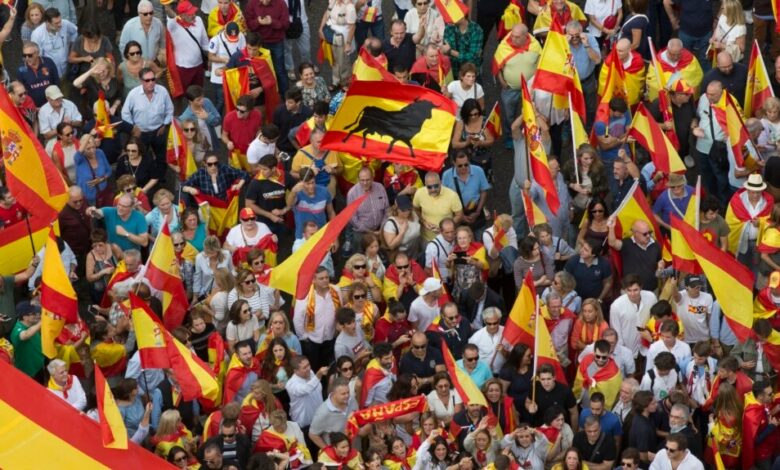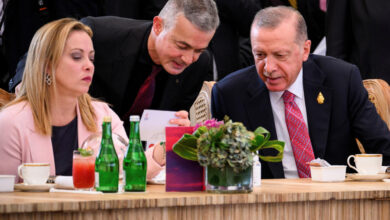Victories in the Spanish race where none won

The results of the last Spanish general elections have yielded a stalemated run between the two Spains as both the right and the left wing parties have fallen short from gaining the 176 seats required to form a government. With the final outcome of the elections in the hands of small separatist parties, Spain has many roads to take. Regardless of which road the Spaniards will take, some victories and defeats are obvious.
Spain’s politics has been plagued by divisions between different nationalisms besides the most serious socio-political division between the two Spains. Unlike in some other Western countries where political debate had been restricted to reconcilable issues until the recent advent of the far right to polarize views, Spain has for decades been divided along extreme lines.
Uncertainty:
The confidence vote on Thursday will be one more occasion for the two Spains to debate their differences yet so many complexities shroud the investiture vote for a Prime Minister (PM) in uncertainty hours before it takes place.
The complexity of the PM’s election, given the lack of a clear majority, polarization, and potential impact of individual votes, is evident. Uncertainty over the King’s proposal adds further complexity. The process will culminate in the investiture session, with the Partido Socialista Obrero Español (PSOE) having a slight advantage, particularly with regards to a possible change of heart on the part of Junts per catalunya whose 6 votes will not go for the right-wing who built their campaign on anti-separatism.
Defeats:
The recent Spanish elections resulted in defeats for almost everyone who took part in the electoral contest. To begin with, the opposition Popular Party (PP) became the largest bloc due to a pyrrhic victory but without a majority. Not to be able to secure a majority is a stunning defeat when it comes with any electoral victory.
The Socialists ran better than expected due to their success in Catalonia and the Basque country but like the PP, they cannot secure the majority needed to maintain power unless supported by Catalan separatists. It is however this leniency with these separatists which drew much of the Socialist electorate far away from PSOE.
As expected the power game is oscillating between the right and left coalitions, both four votes short of a majorityThe Popular Party (PP) won July’s election with 137 seats, falling far short of the 176 needed to govern. With the support of a small regional party, Feijoo could count on 171 votes. Pedro Sanchez’s Socialists won 121 seats, with support from his radical left-wing partner Sumar (31 seats), three Basque and Catalan independence parties, and another small regional party, can count on 171 votes as well.
The man holding the key is Carles Puigdemont and his Junts Per Catalunya Party. Despite his growing pressure for concessions from the Socialists, which could abort coalition efforts due to their inclusion of amnesty for separatists and constitutional changes for an independence referendum, the Catalan leader saw the independence cause lose its appeal to the Catalan public, and that’s his major defeat.
The extreme Left and Right also were defeated in the July elections which came to confirm the decline of Podemos whose representatives were reduced to 5 and Vox whose seats were a major disappointment after polls expected them to secure an easy majority together with PP.
Victories:
Despite waning support from the Catalan voters to independence, Catalan separatists hold the balance of power, with their seven JxCat deputies likely deciding the winner, which allows them to temporarily wield so immense an influence that they cannot garner through elections. Puigdemont’s party’s votes are pivotal, and negotiations between the parties are underway.
Laura Borras, a top leader of JxCat, affirmed, “We have no interest in negotiating over the sworn-in of a Spanish prime minister but we are interested in negotiating the resolution of the conflict with Spain over Catalonia.”
Besides the Catalans, the Spanish establishment and advocates of traditional policies were victorious in the aftermath of these elections. With two mainstream parties coming first and second, twists of policy and public mood are to be excluded in the short run. A message was sent to the leadership of PODEMOS that they need to reform their policy within and outside of the party that emerged from discontent in the aftermath of the Eurozone crisis.
The return to the mainstream not only indicates the failure of the the mass mobilizations of the “indignados” (2011-2014) to come up with a convincing and viable economic alternative but also underscores a victory on the part of those who want to overcome polarization and meet at a centrist middle ground.




